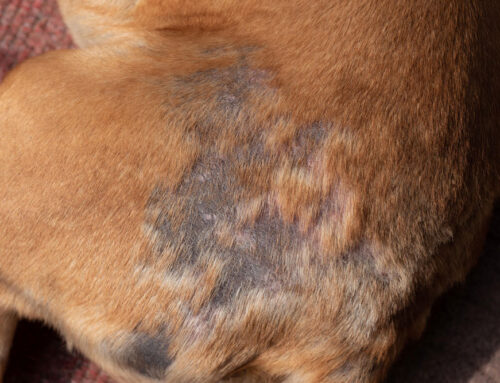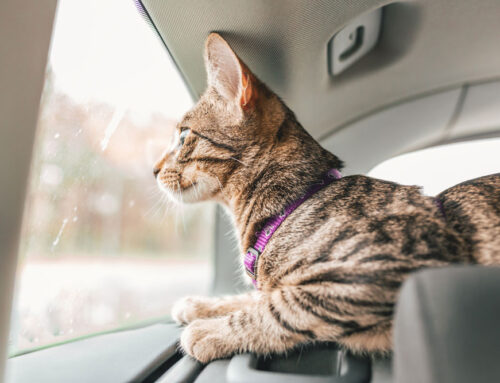Fall is finally here. The weather is cooler and soon enough winter will be here. Not only will we be spending more time indoors, but many rodents like to spend more time in buildings as well, which could mean setting up shop in your garages or homes. Since rodents are often destructive and can spread disease, it is common for people to set out rodenticides (rat baits) or traps. But what many people do not know is that many of the rodenticides, if ingested by your dog or cat, are toxic and potentially fatal. This blog will address the common rodenticide categories and their potential side effects.
Anticoagulant Toxicosis
Common brands:
D-Con, Talon, Havoc, Weather Block, Super Caid, Ratimus, Contrac, Promar, Ramik, Diphacin, Ciad Drat, Rozol, Pival, PMP
How it works:
These rodenticides lead to a deficiency of vitamin K in the body. Vitamin K is necessary for many clotting factors. When there is not enough vitamin K in the body, these clotting factors become depleted, which then can lead to a severe bleeding disorder, which if untreated can be fatal.
Potential side effects:
Bruising on the skin and mucus membranes, ranging from pinpoint/small to larger areas; abdominal swelling; subcutaneous swelling; joint swelling; blood in the stool; nose bleeds; weakness; vomiting; blood in the urine
Side effects can become apparent anywhere from 7 hours to 12 days after ingestion.
Treatment:
If you find out quickly that your dog or cat has ingested one of these rodenticides, take your pet to your veterinarian immediately as it may still be possible to induce vomiting. If symptoms are already present, fresh frozen plasma or whole blood will be necessary to administer clotting factors. Vitamin K1 supplementation will also be necessary. The sooner treatment is started, the better the chance for recovery.
Bromethalin Toxicosis
Common brands:
Hot Shot, Sudden Death, Mouse Killer, Vengeance, Assault, Trounce
How it works:
These rodenticides lead to changes in the central nervous system that result in influxes of sodium into cells, which then lead to swelling and loss of function. The resulting cerebral edema and increase in cerebrospinal fluid pressure are what leads to respiratory failure and death.
Potential side effects:
Muscle tremors; seizures; trouble walking; fever; vomiting; permanent brain damage
Side effects can develop anywhere from a few hours to days after ingestion.
Treatment:
Early detection is key; if you suspect that your dog or cat has ingested one of these rodenticides, take your pet to your veterinarian immediately, where induction of vomiting can be attempted. Supportive care to prevent seizures and decrease cerebrospinal fluid pressure is often necessary as well.
Vitamin D3 (Cholecalciferol) Toxicosis
Common brands:
Quintox, Rampage, Ortho Rat-B-Gone, Ortho Mouse-B-Gone, Ceva True Grit Rampage
How it works:
These rodenticides lead to an increase in mobilization of calcium from the gut and bone. An increase in calcium in the blood stream can then lead to mineralization of the kidneys, gastrointestinal tract, liver, blood vessels, and muscle of the heart; it can also lead to GI stasis, muscle weakness, and decreased neurologic response.
Potential side effects:
Vomiting, weakness, abdominal pain, increased salivation, low heart rate, arrhythmias, bloody vomit or diarrhea
Side effects usually are seen within 12-36 hours after ingestion.
Treatment:
Just as with the other rodenticides, if you suspect that your dog or cat has recently ingested one of these rodenticides, take your pet to your veterinarian immediately, where induction of vomiting can be attempted. If symptoms are already present, fluid diuresis will be needed. Further treatment depends on other abnormalities found on exam and bloodwork.
Prognosis and Summary
In most of the cases, early detection of ingestion before clinical signs develop can often result in a fair to good prognosis. The prognosis with clinical signs already present is more guarded. One of the biggest take home points is that if you use any rodenticides/rat baits in your home or garage, take care to place them in areas where your pets do not have access. Additionally, if you suspect that a pet may have accidentally ingested the rodenticide, take them to your veterinarian immediately and make sure to have handy the information on the exact type of rodenticide it may have ingested.
Resources:
The Veterinary Information Network









Leave A Comment